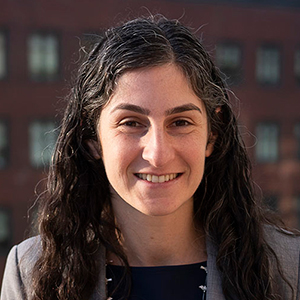By re-engineering materials using bioinspired or green chemistries, we can eliminate, or at least reduce the use of toxic solvents, which would benefit the design of medical devices, water purification membranes, wearable electronics, as well as countless additional devices. In this presentation, I will discuss a few examples from laboratory’s ongoing research thrusts about the benefits of developing greener technologies.

First, I will discuss the effect that the fundamental properties of polymer coatings (i.e., molecular architecture, stiffness, and thickness) have on the adhesion of bacteria under quiescent conditions. By decoupling the effects of molecular architecture, stiffness, and thickness from coating chemistry, we have unlocked specific structure-property relationships that can be tailored to control the initial stage of bacterial adhesion.
By understanding how materials properties influence bacterial adhesion, we may be able to decrease the concentration of commercial antibiotics needed to combat microbial biofilms. As an example of our work on engineering greener water separation membranes, I will illustrate how we are using only water and salt to manufacture ultrafiltration membranes. These membranes are formed using the electrostatic complexation between oppositely-charged polymers. We have demonstrated that by exploiting salt-driven plasticization, we can enable the formation of membranes, as well as additional materials, such as robust textiles. The overall goal of this talk is to highlight some of our recent findings and how these results can guide the green engineering of multifunctional materials that improve human health and the environment.
Jessica D. Schiffman is the Gary R. Lapidus Professor in the chemical engineering department at the University of Massachusetts Amherst. Schiffman received her bachelor’s in ceramic and materials engineering from Rutgers University and her master’s in materials science and engineering, before working as an engineer at Stryker Orthopedics. She next received her doctorate in materials science and engineering from Drexel University before completing a postdoctoral position in Yale University’s environmental engineering department.
Since 2011, Schiffman has directed an imaginative research group that invents polymer-based materials that address grand challenges in human health, the environment, and industry. She has received several research awards, including the ACS Applied Materials & Interfaces Young Investigator Award and being named an Influential Researcher by Industrial & Engineering Chemistry Research.
In recognition of her dedication to mentoring and teaching, Schiffman was awarded the Distinguished Graduate Mentor Award, the ADVANCE Faculty Mentor Award, and the Outstanding Teaching Award.
From 2021-2022, she served as the interim department head of the Department of Chemical Engineering and prior to that as the associate department head. Schiffman currently is the deputy editor of ACS Applied Engineering Materials, an international and interdisciplinary forum devoted to original research.